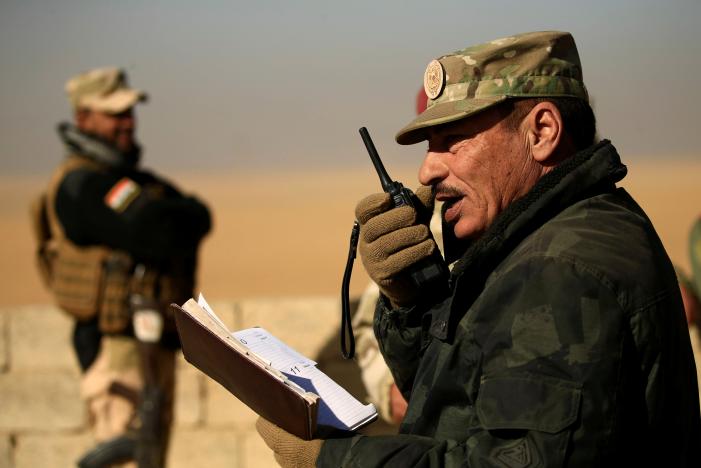Major General Najm al-Jubbouri, a top commander in the offensive against Islamic State in the Iraqi city of Mosul, peered through binoculars at flames after his men shot dead an Islamic State suicide bomber.
It was a small victory for a man whose war against jihadists is deeply personal.
“You are heroes,” he said through a walkie talkie as Iraqi forces cleared another village, hoping to open a new route to the militants’ stronghold of Mosul. “You are heroes”.
Last year, Iraqi Prime Minister Haider al-Abadi asked Jubbouri to return home from the United States to help lead the fight against Islamic State, which swept through Mosul and other parts of northern Iraq in 2014 and imposed a reign of terror.
Jubbouri is upbeat as he paces on the rooftop of a house that serves as a makeshift command center, surveying the battlefield and tightly managing advances.
But he is acutely aware of what Islamic State, also known as ISIS, is capable of.
Last year, he watched an Islamic State video broadcast on social media which showed the drowning of prisoners who are locked inside a steel cage and slowly lowered to their deaths in a pool.
Some of the victims were Jubbouri’s cousins, he said.
“My relatives and citizens suffered a lot from al Qaeda and ISIS. I decided to return back here. In Mosul, ISIS killed a lot from my tribe and from my friends,” he told Reuters in an interview.
Read the whole story from Reuters.
Already have an account? Sign In
Two ways to continue to read this article.
Subscribe
$1.99
every 4 weeks
- Unlimited access to all articles
- Support independent journalism
- Ad-free reading experience
Subscribe Now
Recurring Monthly. Cancel Anytime.
Major General Najm al-Jubbouri, a top commander in the offensive against Islamic State in the Iraqi city of Mosul, peered through binoculars at flames after his men shot dead an Islamic State suicide bomber.
It was a small victory for a man whose war against jihadists is deeply personal.
“You are heroes,” he said through a walkie talkie as Iraqi forces cleared another village, hoping to open a new route to the militants’ stronghold of Mosul. “You are heroes”.
Last year, Iraqi Prime Minister Haider al-Abadi asked Jubbouri to return home from the United States to help lead the fight against Islamic State, which swept through Mosul and other parts of northern Iraq in 2014 and imposed a reign of terror.
Jubbouri is upbeat as he paces on the rooftop of a house that serves as a makeshift command center, surveying the battlefield and tightly managing advances.
But he is acutely aware of what Islamic State, also known as ISIS, is capable of.
Last year, he watched an Islamic State video broadcast on social media which showed the drowning of prisoners who are locked inside a steel cage and slowly lowered to their deaths in a pool.
Some of the victims were Jubbouri’s cousins, he said.
“My relatives and citizens suffered a lot from al Qaeda and ISIS. I decided to return back here. In Mosul, ISIS killed a lot from my tribe and from my friends,” he told Reuters in an interview.
Read the whole story from Reuters.










COMMENTS